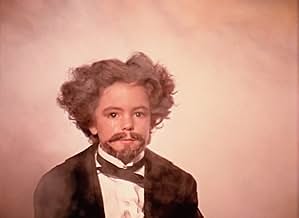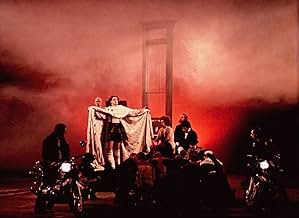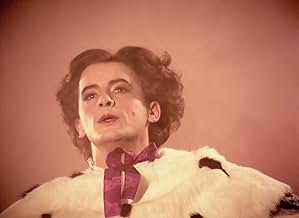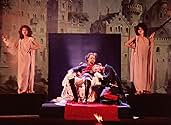IMDb-BEWERTUNG
7,2/10
365
IHRE BEWERTUNG
Füge eine Handlung in deiner Sprache hinzuThe story of the legendary King Ludwig II of Bavaria (1845-1886), his opera interest and friendship with theatre personalities such as Richard Wagner and Joseph Kainz, and at the same time a... Alles lesenThe story of the legendary King Ludwig II of Bavaria (1845-1886), his opera interest and friendship with theatre personalities such as Richard Wagner and Joseph Kainz, and at the same time a reflection of the German 1800s.The story of the legendary King Ludwig II of Bavaria (1845-1886), his opera interest and friendship with theatre personalities such as Richard Wagner and Joseph Kainz, and at the same time a reflection of the German 1800s.
- Regisseur/-in
- Autor/-in
- Stars
- Auszeichnungen
- 3 Gewinne & 3 Nominierungen insgesamt
Gerhard Maerz
- Richard Wagner #1
- (as Gerhard März)
Rudolf Waldemar Brem
- Professor Gudden
- (as Rudolf W. Brem)
Heinrich-Wilhelm Narr
- Kabinettchef Pfistermeister
- (as Heinrich W. Narr)
7,2365
1
2
3
4
5
6
7
8
9
10
Empfohlene Bewertungen
Out of this world, but not for everyone
I gave this a 9 because I acknowledge that not everyone will appreciate Syberberg's cutting-edge techniques and also because I haven't seen this film in almost 10 years (it's very hard to find), and I stumbled upon this site in a quest for it.
For anyone who is interested in film, this is a must see. You can see that Verhooven (The Nasty Girl) and Lars van Trier (Zentropa, Breaking the Waves) must be intimately familiar with this film: the montages, the backgrounds, the different textures. The sound effects. This film may require patience and some background in German history to be completely enjoyed, but even without an iota of either it's still a wild ride.
For anyone who is interested in film, this is a must see. You can see that Verhooven (The Nasty Girl) and Lars van Trier (Zentropa, Breaking the Waves) must be intimately familiar with this film: the montages, the backgrounds, the different textures. The sound effects. This film may require patience and some background in German history to be completely enjoyed, but even without an iota of either it's still a wild ride.
10pekinman
Required viewing for fans of Ludwig II and Richard Wagner
Hans Jürgen Syberberg is best known for his film of Wagner's opera 'Parsifal', a film that I did not like at all. I call myself a Wagnerian and found his cinematic attempt to film that great masterpiece pretty much of a flop. I avoided Syberberg for years and years after that until Facets released his early films 'Our Hitler' and this one entitled 'Ludwig: Requiem for a Virgin King' fairly recently.
I loved this film of Luwig. It helped a great deal that I am very familiar with his life's story and the history of Germany in the 19th century. It was also extremely helpful that I am very familiar with the operas of Richard Wagner. The surreal and often absurd tone of the film falls into place in my head because I've read a lot about these things. The cumulative effect is extremely moving though a tad mawkish at the very end, in the old German manner.
For film buffs who have no experience or pre-knowledge of the people and historical events depicted here this film will be a great challenge. The best approach is simply to let the images and, especially, the text wash over you and sink in over time. It might even inspire people to read more about Ludwig and listen to Wagner's operas. I hope so.
For the casual film goer Syberberg's masterpiece is a non-starter. But for the adventurous and mentally active film buff it is highly recommended. It is required viewing for all Wagnerians and Ludwig-ites.
I loved this film of Luwig. It helped a great deal that I am very familiar with his life's story and the history of Germany in the 19th century. It was also extremely helpful that I am very familiar with the operas of Richard Wagner. The surreal and often absurd tone of the film falls into place in my head because I've read a lot about these things. The cumulative effect is extremely moving though a tad mawkish at the very end, in the old German manner.
For film buffs who have no experience or pre-knowledge of the people and historical events depicted here this film will be a great challenge. The best approach is simply to let the images and, especially, the text wash over you and sink in over time. It might even inspire people to read more about Ludwig and listen to Wagner's operas. I hope so.
For the casual film goer Syberberg's masterpiece is a non-starter. But for the adventurous and mentally active film buff it is highly recommended. It is required viewing for all Wagnerians and Ludwig-ites.
Visual Metaphor -- A Good Thing?
This film is an allegorical presentation of the story of Ludwig II. That is, this film depicts the *myth* of Ludwig II. But don't expect the myth to amount to much in terms of a plot. Ludwig's life is told in a series of episodic tableaux, or loosely related visual metaphors (a technique which happens to be one of Syberberg's specialties). This is a good thing, contrary to what you might expect. The clever poetic quality of the film is what constitutes its enjoyment value. At times, however, the symbols are far too ambiguous or esoteric to actually represent anything. The pacing is also unbearably slow at points.
Although Syberberg is usually considered a member of the "Neues Deutsches Kino" movement, his style really has little in common with his contemporaries. You will not find the ungainly, haphazard, gratuitous incoherence typical of Wenders and Herzog. Nor will you find the dark cynicism of those two directors. I would argue that most of this film is genuinely funny, in a subtle and lighthearted way.
You should be aware that Syberberg is prone to the unfortunate Franco-German tendency of characterizing ideas as products of a particular race, and that he spends much time in the film attacking the "Anglo" idea of industrialism. That being said, he also takes swipes at Nazi figures (largely by associating them with the "Anglos"). The politics are at least strange enough to seem pleasingly exotic.
Although Syberberg is usually considered a member of the "Neues Deutsches Kino" movement, his style really has little in common with his contemporaries. You will not find the ungainly, haphazard, gratuitous incoherence typical of Wenders and Herzog. Nor will you find the dark cynicism of those two directors. I would argue that most of this film is genuinely funny, in a subtle and lighthearted way.
You should be aware that Syberberg is prone to the unfortunate Franco-German tendency of characterizing ideas as products of a particular race, and that he spends much time in the film attacking the "Anglo" idea of industrialism. That being said, he also takes swipes at Nazi figures (largely by associating them with the "Anglos"). The politics are at least strange enough to seem pleasingly exotic.
The death of someone who missed life
Hans Jürgen Zymberberg takes on a historical person with a suppressed personal life, an ultimate romantic who lives only in art.
The film composes an operatic work, absolutely unique. Shot entirely in a studio, brightly lit with equally vivid colors. But there are no sets. The faces move in front of projections of the spaces.
There is no attempt at realism here. Only a reminder of reality through continuous center shots. A typically German theatricality prevails without any break, an ostentatious theatricality that suits the person it sketches so well.
The material for this portrait is equally theatrical and arbitrary. There are no hesitations about borrowing from everywhere, nor about its limitless aesthetics.
And yet this collage, this delirium that initially surprises, manages to touch the heart of a person trapped inside his own body and the environment he found himself in. And mostly fatally trapped, in the role he was forced to play.
Because Ludwig is a fallen angel, a person who has nothing to do with power but has to play the ruler. Even if he wanted to, it is impossible for him. He can't play other people's game.
Those who put him in this position realize that he is not the subordinate they expected, he is an obstacle. So, they will dethrone him and immediately after that they will assassinate him. And perhaps this death and the wet grave of a lake, is a redemption for him who had everything at his feet but missed life so much.
The film composes an operatic work, absolutely unique. Shot entirely in a studio, brightly lit with equally vivid colors. But there are no sets. The faces move in front of projections of the spaces.
There is no attempt at realism here. Only a reminder of reality through continuous center shots. A typically German theatricality prevails without any break, an ostentatious theatricality that suits the person it sketches so well.
The material for this portrait is equally theatrical and arbitrary. There are no hesitations about borrowing from everywhere, nor about its limitless aesthetics.
And yet this collage, this delirium that initially surprises, manages to touch the heart of a person trapped inside his own body and the environment he found himself in. And mostly fatally trapped, in the role he was forced to play.
Because Ludwig is a fallen angel, a person who has nothing to do with power but has to play the ruler. Even if he wanted to, it is impossible for him. He can't play other people's game.
Those who put him in this position realize that he is not the subordinate they expected, he is an obstacle. So, they will dethrone him and immediately after that they will assassinate him. And perhaps this death and the wet grave of a lake, is a redemption for him who had everything at his feet but missed life so much.
Wusstest du schon
- WissenswertesFirst part of Hans-Jürgen Syberberg's trilogy on German history, also including Karl May (1974) and Hitler, ein Film aus Deutschland (1977).
- VerbindungenFeatured in 2X7: Falco (1986)
Top-Auswahl
Melde dich zum Bewerten an und greife auf die Watchlist für personalisierte Empfehlungen zu.
Details
- Erscheinungsdatum
- Herkunftsländer
- Sprachen
- Auch bekannt als
- Ludwig - Requiem for a Virgin King
- Produktionsfirmen
- Weitere beteiligte Unternehmen bei IMDbPro anzeigen
- Laufzeit
- 2 Std. 20 Min.(140 min)
- Sound-Mix
- Seitenverhältnis
- 1.37 : 1
Zu dieser Seite beitragen
Bearbeitung vorschlagen oder fehlenden Inhalt hinzufügen






























